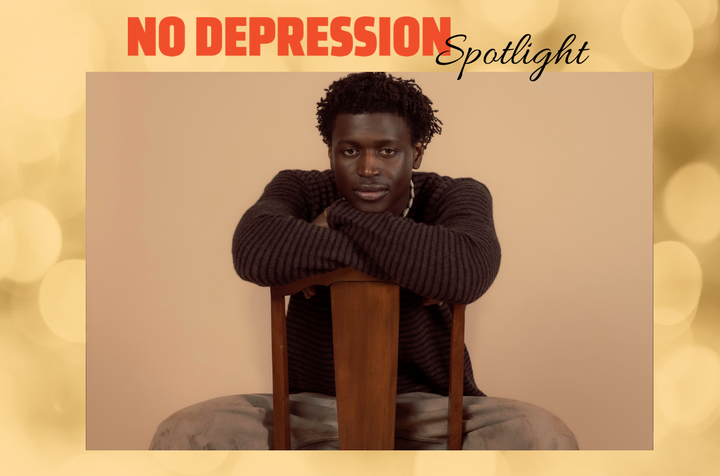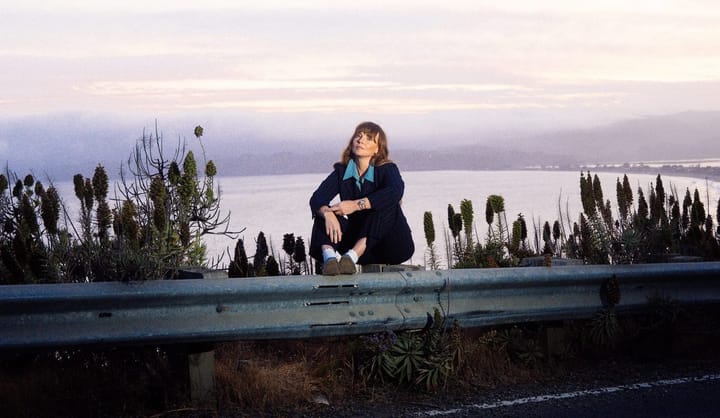"Father. Artist. Midwesterner. Eccentric. Walker..." So begins Paul Westerberg's noun-filled description of himself in the bio for his new album, Suicaine Gratifaction. The order of the words is important, for not only is Westerberg an astute judge of his own character, he's also a stickler about prioritizing. As always, he relishes the notion of mixing flaws with strengths, dysfunction with adaptability, self-doubt with certitude. "Romantic. Liar. Has-been. Hero..."
No one knows Paul Westerberg better than Paul Westerberg, and therein lies the key to his art. He may not always like what he sees in the mirror, but he never flinches from looking.
These days Westerberg seems more comfortable in his own skin than he's ever been. Once a great songwriter for a great rock 'n' roll band, nowadays he's simply a great songwriter, unencumbered by any sense of duty to write for anyone but himself. Still, far from betraying aging Replacements fans who once viewed him as the exemplar of their own youthful confusion, Westerberg has, in his solo career, lighted a way toward maturation. Lou Reed once titled an album Growing Up In Public. In the case of Westerberg, the phrase is a tattered emblem unfurled across his entire catalog.
Co-produced with Don Was, Suicaine Gratification finds Westerberg plunging even deeper into the introspective terrain that has dotted much of his previous work. Mixing lots of piano balladry with a handful of guitar-lite rockers ("fucked-up folk music," Westerberg calls it), the album is less concerned with execution than with songcraft. As always, wordplay is rampant throughout, only now the "play" is intertwined with the sort of contemplative musings one would expect in a man reaching the end of his 30s (Westerberg will turn 40 on Dec. 31, 2000).
During the making of Suicaine Gratification, Westerberg (at the suggestion of Was, at times) enlisted help from such illustrious peers as Shawn Colvin, Jim Keltner, and the Heartbreakers' Benmont Tench. But perhaps more than ever before, this is Westerberg's show all the way.
NO DEPRESSION: On your previous album, Eventually, it was especially important to you that the songs fit together well. How important was that to you this time?
PAUL WESTERBERG: I gave no concern to how the songs fit; they just did. They were all written within a period...in a similar frame of mind, and they all seemed to have a thread, whether it was [due to] my state of mind, or lack of over-instrumentation, or the fact that it was mostly recorded at home. But it felt like they all belonged on the same record, to me.
ND: Eventually had a sort of "passage-of-time" theme. Are you saying you didn't have a theme specifically in mind for this one?
PW: Well, it isn't a concept album. Had there been another slow song that happened to be about, say, carnival workers, I wouldn't have left that off because it didn't fit. If it was a good enough song, I would have kept it on. But I guess there's a kind of feeling of moving on, or of not knowing where to go to next. I think [the song] "Fugitive Kind" sums it up well.
ND: Assuming that "It's A Wonderful Lie" is largely autobiographical, do you really think of yourself as a misanthrope, sometimes?
PW: Yes -- the key word being "sometimes." I'm assured that I'm not, by others, but it feels that way at times. It all goes back to self-love. If you don't love yourself, it's impossible to love others. It all stems from self-absorption, or lack of self-esteem -- something like that. But on a lighter note, I've always been a bit of a loner, and preferred my own company. The song is a play on words, obviously, from [the film] It's A Wonderful Life. For years I've wanted to twist that title around, because...it's a great movie, but I always found discrepancies in it. Part of me thought, yeah, I feel like [the James Stewart character] should've done what he did, or done what he always wanted to do. I mean, if you can be happy with your life the way it is, and forget about the dreams you once had, you're a mighty strong person. I guess that's most of us, but it's like, the whole point of the song is to follow your dreams no matter where they lead you.
ND: You say you prefer your own company. Have you ever been afraid your life might become insular to the point that it might be detrimental to your writing?
PW: Well, I'm not so interested in being a writer that I do things that are good for my writing, or bad for my writing -- which is probably like the classic writer. (laughs) I don't drink anymore, but if a writer chooses to drink himself to death, is that good or bad for his writing? It's like, I don't care. It's just what you want to do. [Solitude] is part of my make-up. From the time I was a young child, I've always preferred my own company. And I need to be alone when I work. I need to gather material in the company of others, but I [also] do a lot of my thievery from books, as it were.
ND: On Suicaine Gratifaction, there's a sense that you're certain of what you're doing -- more so than on Eventually or 14 Songs. There's nothing tentative about the approach.
PW: If only... The truth is... (pauses) I'll give you this much: Yes, I was certain in my uncertainty. I didn't have clue, and yet I knew my gut would lead me to where I was supposed to go. Last time out, or with the last two records, I had a better idea of what I wanted to do. I didn't know what I wanted to do this time, and yet, any time anything false reared its head, it was immediately discarded.
ND: How good are you at quickly judging your own work? Do you have to let it sit awhile, and then come back to it?
PW: I think I do. I think that's why I continue to look for production help. I'm never sure whether my stuff is good or not. I think I've gotten better at immediately knowing what's crap, but I'm still not sure of how good the good stuff is. I judge that by whether or not something excites me, or stirs me, right away. And it's funny, when you listen to a record, the things that stir you upon first listen aren't always the things that are deep. "Suzanne", by Leonard Cohen, for instance -- I never liked that, really. It took me several listens to understand the beauty of that song. I'm aware of that, so even when I think something isn't great, I'll hang with it for a while. One little hint I've come to understand is, if I'm terrified to say something, I'm pretty sure that's the thing to say. (laughs) But I try not to use that on every song.
ND: You've always been modest about your guitar playing and your keyboard work, and yet you rarely solicit outside help on either instrument. Can you explain why?
PW: Well, I enjoy it. [To use someone else] would be like borrowing someone else's eyes, or someone else's hair, for a date. It's part of what I am. I think my lack of skill on both instruments makes me play things that no one in their right mind would ever play. The piano solo on "Born For Me", for instance -- you couldn't have paid a guy to play that clumsily, but every note is exactly what we needed. I think I have a sense of economy. That's what my lack of chops gives me.
ND: What percentage of your composing takes place on keyboards, these days?
PW: On this record, it's about half and half. I still write a lot more songs on guitar, things that never see the light of day. The better songs, more and more, are coming from the keyboard, I think. The more memorable melodies. There's a sense of cocksure bravado that comes with playing the guitar, where you can say something a little dumb and get away with it. At the piano, I don't feel comfortable unless I really have something to say. I feel more vulnerable at the piano. It's like, I couldn't pick it up and hit someone with it.
ND: In the early '90s, a lot of "grunge-pop" bands were influenced by the Replacements -- groups like Gin Blossoms and the Goo Goo Dolls. Today, it seems your writing has a greater influence on alternative country bands like Whiskeytown and the V-Roys. Do you ever listen to those groups?
PW: No, not at all. See, that's the rub. People will say, "Ah, you gotta hear these guys, Paul. They remind me so much of [you]." And that's really the last thing I want to hear. I don't want to hear something I can do. It's like, play me something that I don't have a handle on. That's more interesting, to me.
ND: How is your time filled between albums, particularly since you have a family now? Do you write every day?
PW: No. I went for the longest time without writing. I collect scraps. I have about twelve little notebooks, with one sentence in each of them. I spend a lot of time with [my son] now. He's seven months old. And I work out of my home, so it's difficult to just go downstairs, shut myself away from everything, and come up later. It's strange. I'll need to travel, probably, in order for the next phase to make itself clear. Whether or not that takes the form of a tour, that's what will probably give me fodder for the next creative burst. I can't just sit at home and make a record. I have to go away first, in order to become inspired to make it.
ND: After you finished the tour for Eventually, you left Reprise and signed to Capitol. Was that a case of Capitol agreeing to let you approach your career the way you wanted to?
PW: Yes, I think so, in a way. I was encouraged by [former label president] Gary Gersh, who signed me. I met with him in his office, and...it was like the used car salesman who tells you you're driving a piece of junk in order to make you buy a new one. He got halfway through his spiel, and I said, "What do you think about this?" And I played him "Self-Defense." He said, "That's exactly what I want." We were on the same wavelength. I already had the dark, "real deal" record he was looking for. He wasn't looking for a big, guitar-slinger record, and I wasn't making one. And then, of course, the day the record was mastered, he was gone. But that doesn't really matter. Record companies are all kind of the same.
ND: Are the things that inspire you, or that motivate you to write, substantially different from what they were, say, ten years ago?
PW: I don't know. I'm struggling with that. I think there are less and less reasons to write. The only real reason to create something is if you feel the need to create it. I can train myself not to create, but then I become sort of a zombie, and then I'm not happy. Two weeks ago I wasn't creating at all, but I felt very dull, like I was walking around with hollowed eyes. Recently I bought a camcorder, and that's brought me to life, because it's making me think in different ways, and it's actually forced me to put strings on my guitars, and tune the piano. I need things to inspire me. I used to look for people to inspire me, and when you don't leave the house, you lack for inspiration. (laughs)
ND: How has the camcorder inspired you?
PW: Well, it may be my tour. I may simply record [on videotape] each of the songs in my basement, in some form or another, and release those to at least whet people's appetites. Another thought was to do a pay-per-view from the basement, but that makes it sound like I'm afraid to leave the house. I want to travel, but I'm just not prepared to go onstage and present a good deal of this music. It's not really geared for performance. To go onstage and perform "Self-Defense" for people in a bar, or an auditorium...I don't know. Something about the intimacy of that [type of song] would be destroyed. I mean, can you imagine one heckle? I'd end up telling someone to fuck off, and that would be the end of the song.
And I'll tell you, honestly, I don't know if I could sit down and play any of the songs on the record. My brain has gotten to the point where it can only go forward; it can't go stop, or go in reverse. A lot of this stuff was written in funny tunings, and I didn't even write down what the chords were. It was really -- terrible word, here -- "organic." I don't know how these songs grew. In some cases, it would be painful to figure out how to redo them. Some of them -- "Final Hurrah", for instance -- I can remember, but in most cases, I played them once, and then the next day forgot about them. And that's a good way to go, because then you don't consider yourself a performing artist. You just make things, and if you can record them for money, then that's great.
ND: Are there people working today whose songwriting you particularly admire?
PW: You know, I'm not necessarily in awe of a great songwriter. It's like, if I'm considered one, great, but I'd rather listen to a Sheryl Crow song that maybe isn't great, but that gets the job done. I'd rather hear something that gets me from the bank to the store than listen to the deep, Elliott Smith-type stuff, because I can hear that shit in my head any time I want to. When you really become the artist you set out to be, you focus on your own art, and that takes all your time. You don't have time for anyone else.
ND: How conscious are you of trying to leave a legacy? Do you think at all in those terms?
PW: No, I guess I don't. If you're a major success, you think about those things, because that's the next step. I still think it would be nice to just to sell more records than Lucinda Williams. (laughs) I don't give a shit about 50 years from now; I'd just like to move some units. But I'm confident enough in what I've done to feel it'll be sought out, and known about.
Russell Hall lives in Anderson, SC, where he's still trying to explain to his parents what he does for a living. His first published music article was a review of Paul Westerberg's 14 Songs.




Comments ()